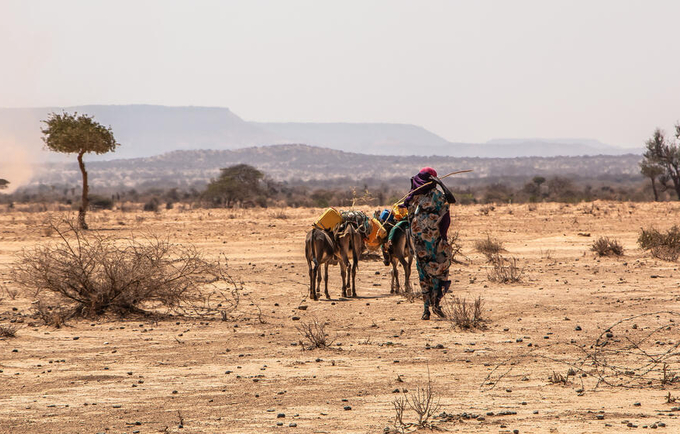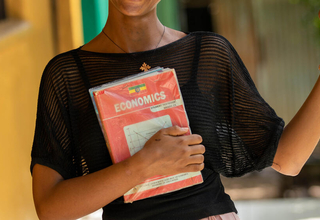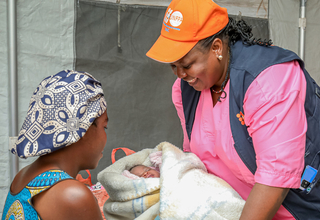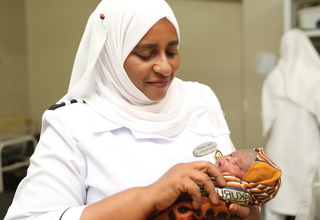DUDUMACAD, Ethiopia – “Saving the life of this baby was a miracle and a blessing for my family. I am immensely grateful,” said Amino Bashir, 25, as she held her newborn.
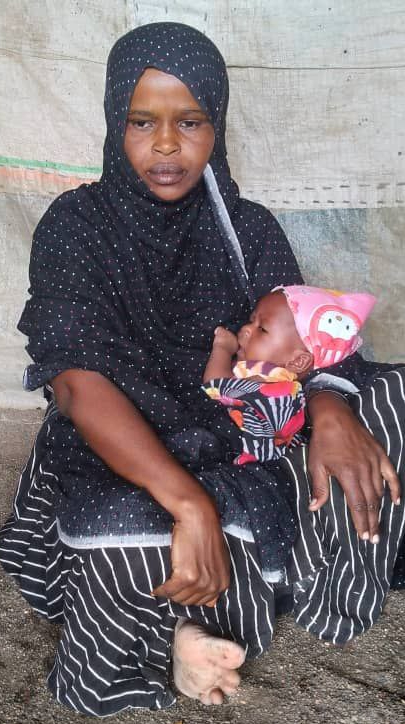
Ms. Bashir lives in Dudumacad in the Somali region of Ethiopia – one of the areas devastated by a gruelling drought across the Horn of Africa that has affected more than 36 million people so far.
This was her fourth pregnancy, but her first safe and successful delivery: The last three had all ended in heartbreak, as one died before term and the others were stillborn after she went into labour at home without any professional help.
Many health services, including for critical maternal care and family planning, are either suspended or severely limited in Ethiopia following years of conflict, drought and most recently devastating flash flooding. Over 260,000 women are currently pregnant in the Somali region alone, many of them internally displaced from recurrent, multiple crises and at dire risk of acute undernourishment. Forced to migrate in search of water, food and pasture, thousands of pregnant women and new mothers are without access to even the most basic health care.
In Ms. Bashir’s case, community volunteers from UNFPA’s partner the Organization for Welfare and Development in Action were decisive in averting another stillbirth. The volunteers are reaching women through local support groups and by going door to door to raise awareness on the availability – and life-saving potential – of trained birth attendants at local health facilities.
The impact of skilled birth deliveries on newborn care
Selamawit Asnake, who has received long-term training and mentoring from UNFPA, assisted Ms. Bashir in delivering her baby at the UNFPA-supported Dudumacad health centre. “The baby’s heartbeat was weak, with no crying,” she said. “I immediately cut the umbilical cord and began the resuscitation process.”
The newborn wasn’t responsive, but Ms. Asnake continued her attempts, monitoring his vital signs. “After 15 minutes of much effort, the baby began to breathe. But his breathing was irregular so I decided to call the ambulance and refer him to the Fik Hospital [around 40 kilometres away] for further treatment.”
After spending his first three days in the neonatal intensive care unit, baby Farxan was stable, breathing and out of danger.
Over 4.5 million women and babies die every year worldwide during pregnancy, childbirth or the first weeks after birth – equivalent to one death every seven seconds. Ethiopia has the fifth-highest rate in the world of maternal and neonatal deaths and stillborns. Globally, every seven seconds a woman dies from childbirth or pregnancy complications that could largely have been prevented or their causes treated if proper care had been available.
Most of these deaths and complications could have been prevented if the expectant mother were attended by a skilled birth attendant.
Yet ensuring that care is particularly challenging where national health systems are already on the brink of collapse, especially in countries grappling with a humanitarian crisis.
“Unassisted home deliveries contribute to an increased risk of complications for the mother and her baby that can cause death and lifelong disabilities. Most of these deaths and complications could have been prevented if the expectant mother were attended by a skilled birth attendant,” explained James Okara Wanyama, a doctor and coordinator of UNFPA’s humanitarian programmes in Ethiopia.
Improving maternal and newborn care
So far in 2023, UNFPA has deployed over 200 trained midwives to support maternal and newborn health care across five conflict- and drought-affected regions of Ethiopia. Health and outreach workers as well as six maternal health mobile teams have also been deployed to increase awareness and encourage people from crisis-hit communities to seek expert medical advice and support; these services have so far reached over 300,000 women and girls.
The capacity building and monitoring programme that helped save baby Farxan is part of a joint project UNFPA is carrying out in the Somali region, together with UNICEF and with funding from Ireland. Some 95 participants were trained in maternal and reproductive health, including emergency obstetric and newborn care, clinical management of rape and responding to cases of gender-based violence in emergencies. Medical equipment such as hospital beds, reproductive health kits and thousands of dignity kits have also been provided to more than 190,000 people in crisis-affected areas.
The UNFPA Humanitarian Response Appeal 2023 is calling for $45 million to respond to the health and protection needs of women and girls across crisis-affected regions in Ethiopia, where women and children currently make up more than two thirds of the people in need. To date the appeal is just under 50 per cent funded.
